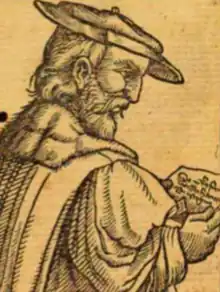Vincent Obsopoeus
Vincent Obsopoeus (or Opsopoeus) was a German humanist, Latin poet, and translator active in the Reformation. His most famous work, De Arte Bibendi (The Art of Drinking), was written and published in 1536. He published a second edition in 1537, and died in 1539.[1]
Vincent Obsopoeus | |
|---|---|
| Died | 1539 |
| Pen name | Vincentius Obsopoeus |
| Language | Latin |
| Nationality | German |
| Notable works | De Arte Bibendi
Diodori Siculi Historiarum Libri Aliquot, qui extant In Graecorum epigrammatum libros quatuor Annotationes longe doctissimae |

Biography
Born Vincent Heidnecker in “Vindelitia” (i.e. Bavaria), Obsopoeus was the son of a chef for local princes and the wealthy.[2] He too began his career by training to be a chef, but fell in love with literature, and by 1526 was living in Nuremberg.[3] He soon became active as a translator from Greek into Latin, from Latin into German, and German into Latin. He translated many of Martin Luther's works. For a number of years, Obsopoeus was rector (principal) of the classical Gymnasium in Ansbach; Albert Alcibiades was one of his students there.[4] In 1529, he published a Latin translation of some less popular pieces by Lucian.[5] The book includes a translation of Prodicus's fable Hercules at the Crossroads; a manuscript copy is also extant . In 1531, he was wrongly suspected of writing The Pig War by Philip Melanchthon, with whom he had had a falling out.[6]
For a number of years, friends and rivals accused Obsopoeus of enjoying wine too much, and the accusation cost him several professional job opportunities. In 1536, in gleeful revenge, he wrote De Arte Bibendi, the world's first guide to drinking alcohol.[7] In book two, Obsopoeus alludes to Lucian's dialogue Slander: A Warning to strike back at his enemies.[8]
In 2020 and 2021, De Arte Bibendi was translated into English, German, Spanish, and Japanese.
In 1539, he wrote Diodori Siculi Historiarum Libri Aliquot, qui extant. He died that same year. His book In Graecorum epigrammatum libros quattuor Annotationes longe doctissimae appeared posthumously in 1540.
Works
- Obsopoeus, Vincentius (transl.). 1525. Martini Lutheri Epistolarum farrago ... cum psalmorum aliquot interpretatione. Haganau: Secer. (Obsopoeus dedicates this translation to his brother Michael Obsopoeus, a preacher in Bavaria.)
- Obsopoeus, Vincentius. 1529. Elegantissima aliquot Luciani opuscula. The book contains dedicatory epistles to George of Brandenburg-Ansbach, Konrad Peutinger, Philipp Gundelius, the reader, Michael Mastaller (including an original Greek epigram), Martin Weiss, Dominick Sleupner, Georg Puecher, Christoph I Gugel, and one Tilomannus Gunderod, who was a young student of his at the time.
- Obsopoeus, Vincentius. 1534. ῾Ηλιοδώρου Αἰθιοπικών βιβλία δέκα / Heliodori Historiae Aethiopicae libri decem. Basel: Hervag. (here)
- Obsopoeus, Vincentius. 1536. De Arte Bibendi. Basel: Norimbergae.
- Obsopoeus, Vincentius. 1537. Macrobii, id est Longaevi (a translation, apparently the first into Latin, of Lucian's Octogenarians/Long-Livers). In De Senectute. Nuremberg: Joh. Petreius.
- Obsopoeus, Vincentius. 1539. Diodori Siculi Historiarum Libri Aliquot, qui extant. Basel: Johannes Oporinus. VD16 D 1826.
- Obsopoeus, Vincentius. 1540. In Graecorum epigrammatum libros quatuor Annotationes longe doctissimae. Basel: Brylingerus. VD16 O 814.
Obsopoeus contributed a 30-line epigram to the Sylva Bibliocorum Nominum of Andreas Althamer (1530).
References
- Wilhelmi, Thomas. 2015. “Opsopoeus, Vincentius.” In: Frühe Neuzeit in Deutschland 1520-1620. Literaturwissenschaftliches Verfasserlexikon, vol. 4, Berlin and Boston: De Gruyter, 664-673.
- Schiller, Ludwig. 1874/5. “Die Ansbacher gelehrten Schulen unter Markgraf Georg von Brandenburg.” Programm zur Schlussfeier des Jahres 1874075 an der Königlichen Studienanstalt zu Ansbach (Ansbach: Brügel und Sohn), 1-36 (online here). Schiller extracts and contextualizes the many biographical details that Obsopoeus shares in the various prefatory letters found in his Luciani opuscula.
- Schiller 1874/5, p. 9
- Johannes Voigt, Markgraf Albrecht Alcibiades von Brandenburg-Kulmbach Berlin 1852, Volume 1, p. 42
- Obsopoeus, Vincentius. 1529. Elegantissima aliquot Luciani opuscula.(online here). The translated pieces are Zeus Catechized (Zeus Cross-Examined), Zeus Rants, Anacharsis or Athletics, The Passing of Peregrinus, Demonax, My Native Land (An Encomium of Fatherland), Phalaris 1, Phalaris 2, The Scythian or the Consul, Herodotus or Aetion, Zeuxis or Antiochus, Harmonides, Hippias or The Bath, Dionysus, Amber or The Swans, The Dipsads, A Conversation with Hesiod, Halcyon, The Dance (Of Pantomime), Essays in Portraiture (Images), Essays in Portraiture Defended, The Parasite: Parasitic an Art, Hermotimus or Concerning the Sects, and The Parliament of the Gods.
- Phontaine, Michael 2019. John Placentius: The Pig War. New York: Paideia Institute Press.
- "What Doesn't Kill You Makes You Stronger [by Michael Fontaine]".
- Fontaine, Michael. "The Art of Slander: How to Create a Masterpiece, Troll your Enemies, and Win Bigly." Classical Wisdom Litterae November 2020, iii-xvii. (online here)